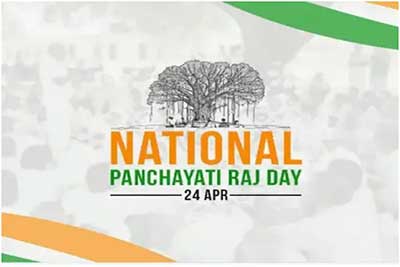National Panchayati Raj Day 2021
In News
Since 2010, April 24 is celebrated as National Panchayati raj Day every year.
About
With 73rd amendment act in 1992 it came in to force on 24th April, 1993 where states were empowered to organize village panchayats and give them power to work as self governing units.
The idea behind the Panchayati Raj system was to make democracy functional at the grass root level and driven by citizens’ needs and participation. It was hence introduced as a three-tier system that decentralized governance, decision making, and local development.
Mahatma Gandhi was the foremost leader to support the
Panchayati Raj. His perception of a village panchayat was a small
self-sufficient republic with individual freedom, opportunities for all, and
full participation of the people.
Article 40 talks about PRIs mentioned in Directive Principle of State Policy in
1950. It stated that steps shall be taken to organize village panchayats, and
provide them with the powers and authority necessary for them to act as units of
self-government.
Structure
A three tier elected self-government known as the Panchayati Raj Institution was suggested—with specific duties and responsibilities outlined—thereby formalising the intent of Article 40. The three tiers are Village Panchayat, Panchayat samiti (Block Panchayat) and Zilla Parishad.
The Village panchayat is headed by Sarpanch or Pradhan who is elected for five years.
The 2nd tier, Panchayat samiti is elected by members of panchayats and takes charge of all development activities under its jurisdiction.
The top most tier of Panchayat is Zilla Parishad. It comprises of representatives of the panchayat samiti and district level officers from different wings of the government. It mostly coordinates developmental works that are proposed or underway in the district by the panchayat samiti.
Panchayat Extension to Scheduled Areas (PESA) Act of 1996 also gave greater autonomy to people residing in tribal and forest areas.
Panchayats have:
- Decentralized the democratic process
- Power is devolved upto grass root/ local level
But still gaps exits:
- State authority and officials are reluctant to provide real power to local elected leaders.
- Bodies like the district planning boards, created to accelerate decentralised planning, are either non-functional or do not give precedence to PRIs.
- Minimal efforts have been made to authorize elected PRI representatives with their constitutional functions; main emphasis has been on trainings on the schemes and programmes.
- Overlapping of role of the state and central government and the PRIs on creating separate structures or units for implementing specific projects on education, health, and so on has limited the role and powers of the PRIs.
Perhaps the time has come to move from political representation to power devolution. State Political leadership should accept the importance of PRIs, and devolve power to them as instructed in the Constitution of India. Capacity building of the PRIs should be not as mere implementers of the projects but as planners and evaluators to strengthen the institution.









